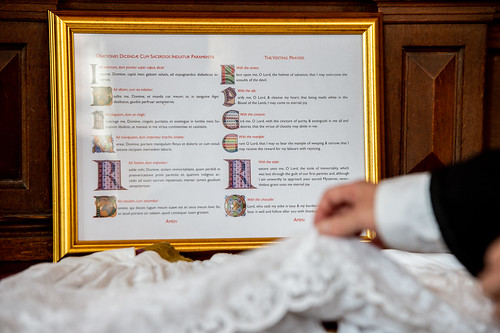 |
| Bilingual Vesting Prayers in the Sacristy of Westminster Cathedral |
There is an amusing video on YouTube showing an American Latinist engaging priests in the Vatican in spoken Latin. He remarks that he spoke to a dozen priests, but only three were brave enough to go on camera with him and use Latin in actual dialogue.
Spoken Latin might sound like the preserve of hobbyists, like spoken Elvish or Klingon, but being able to speak a language is the ultimate test of fluency, and for the Church, Latin isn’t just any other language. As well as being the sacred language of the liturgy, it is an indispensable key to the Church’s theology, history, law, philosophy, and poetry. As Pope Benedict XVI described it, it is the language the Church considers as her own.
It is for this reason that Latin has always formed an essential part of the education of the clergy. The Second Vatican Council’s decree on Priestly Training, Optatam Totius, says seminarians “are to acquire a knowledge of Latin which will enable them to understand and make use of the sources of so many sciences and of the documents of the Church” (13). This means a serious grasp of the language: being able to sit down and read St. Augustine, for example—not as a homework exercise, but because you want to know what he says about something.
There is no link to the full article.
ReplyDeleteApologies, I've put it in.
DeleteA friend of yours teaches Latin - to his children!
ReplyDeletehttps://www.youtube.com/watch?v=f1hb0jU8jCA&list=PLkt7e8T-YCwKBpj9bpMtIoUm9PPxvFe22
The difficulty with the teaching of Latin, and languages in general, in a formal setting these days is the method used; the Prussian or Grammar-translation method which became popular in the mid-19th century in Germany. The evidence is that this method does not result in fluency; we, without exception, learn languages by understanding an huge number of messages in them, whether it be by context, grammar, or some other means. Learning a language is more a matter of memory than logic (No theoretical knowledge of the grammar of a language is needed to speak it perfectly; I am not thinking of grammatical rules as I write this now as I simply remember how things are said in English) for, although a language can be summarised in grammatical rules, there are so many exceptions and illogical conventions in any language that the only way to learn them is through exposure. It is also beyond the capabilities of the human intellect to apply all the grammatical rules necessary consciously, so the knowledge must be instinctive. One could conceivably study grammar theoretically and attempt to use one's theoretical knowledge to try to gain a practical, instinctive, knowledge of the grammar through reading, but this seems to be unnecessarily adding a step and is not advisable in my opinion unless there is a deficit of appropriate materials, which for Latin there is not. Luke Rannieri (the Latinist mentioned who spoke Latin in the Vatican) learnt through a book called Familia Romana (which is to be highly recommended) and then consuming an huge amount of input (mainly through reading). Learning to speak generally becomes much easier after one has a solid understanding of the language through passive exposure (though to establish a solid base takes many hundreds of hours of exposure). For people who are interested in learning more about language acquisition, I recommend the theories of Stephen Krashen and the YouTube channels of polyglots such as Steve Kauffman, Olly Richards, 'Matt vs Japan', and Luke Rannieri (ScorpioMartianus and polymathy).
ReplyDelete